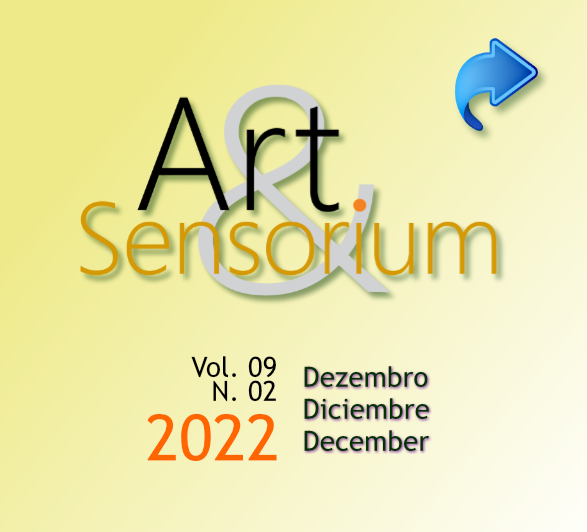A impossibilidade da ‘arte como tal’ na fronteira decolonial
DOI:
https://doi.org/10.33871/23580437.2022.9.2.34-50Resumo
Este artigo explora os espaços de impossibilidade da arte na fronteira decolonial, como espaços que tem potência poética. Nesse processo analisa o discurso universalista e individualista da estética moderna ocidental repleto de possibilidades que são ao mesmo tempo impossibilidades no contexto das relações entre arte moderna e regimes coloniais. Para fazer visíveis as contradições do discurso e a impossibilidade da arte como lugar de potência estética parte-se da diferenciação de arte como tal de Stephen Wright, da perspectiva descolonizadora de ch'ixi, ou manchado, de Silvia Rivera Cusicanqui e double bind, ou convivência dos contrários, de Gayatri Spivak onde os espaços de impossibilidade da arte colocam em evidência as relações coloniais. Nessas bases observam-se indícios da chamada polícia da arte, de Jacques Rancière, nos casos da arte naive haitiana e arte aborígene australiana. A análise revela evidências da potência estética de espaços onde a arte como tal é impossível e ao mesmo tempo questiona a universalidade da matriz ocidental como uma imposição colonial.
Downloads
Downloads
Publicado
Edição
Seção
Licença
Copyright (c) 2022 Art&Sensorium - Revista Interdisciplinar Internacional de Artes Visuais

Esta obra está licenciado com uma Licença Creative Commons Attribution 3.0 Unported License.
Autores que publicam nesta revista concordam com os seguintes termos:- Autores mantém os direitos autorais e concedem à revista o direito de primeira publicação, com o trabalho simultaneamente licenciado sob a Licença Creative Commons Attribution que permite o compartilhamento do trabalho com reconhecimento da autoria e publicação inicial nesta revista.
- Autores têm autorização para assumir contratos adicionais separadamente, para distribuição não-exclusiva da versão do trabalho publicada nesta revista (ex.: publicar em repositório institucional ou como capítulo de livro), com reconhecimento de autoria e publicação inicial nesta revista.
- Autores têm permissão e são estimulados a publicar e distribuir seu trabalho online (ex.: em repositórios institucionais ou na sua página pessoal) a qualquer ponto antes ou durante o processo editorial, já que isso pode gerar alterações produtivas, bem como aumentar o impacto e a citação do trabalho publicado (Veja O Efeito do Acesso Livre).





